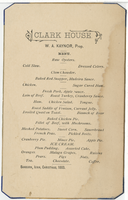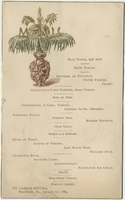Search the Special Collections and Archives Portal
Search Results

Christmas menu, 1883, Clark House
Date
Archival Collection
Description
Text

St. James Hotel menu, January 1, 1884
Date
Archival Collection
Description
Text
Nancy Ellen Webb Williams Papers
Identifier
Abstract
The Nancy Ellen Webb Williams Papers (1983 to 1996) are related to William's career as a writer. The papers include newspaper clippings, photos, fliers, and correspondence. Also included is one of Williams' books of poetry, "The Soul Side: Big Mama Remembers."
Archival Collection
UNLV Libraries Collection of Argosy Gaming Company Promotional Materials and Reports
Identifier
Abstract
UNLV Libraries Collection of Argosy Gaming Company Promotional Materials and Reports includes annual reports, financial reports, prospectus, equity reports, stockholder meeting notices, 10-K reports, 10-Q reports, and newspaper clippings for Argosy Gaming Company in Alton, Illinois, dating from 1993 to 2001.
Archival Collection
Las Vegas News Bureau Photograph Collection
Identifier
Abstract
The Las Vegas News Bureau Photograph Collection consists of black-and-white and color photographic prints, negatives, and slides depicting Las Vegas, Nevada from approximately 1940 to 1989. The images primarily depict hotels on the Strip in Las Vegas, Nevada, including Caesars Palace Las Vegas Hotel and Casino, the Flamingo Hotel & Casino, and the Desert Inn Hotel and Casino. Also included are images of the convention center in Las Vegas and Cashman Field, as well images of entertainers performing on the Las Vegas Strip. The collection consists entirely of photographic reproductions.
Archival Collection
Morrison Family Photograph Collection
Identifier
Abstract
The Morrison Family Photograph Collection (1917-1933) consists of black-and-white and color photographic prints, negatives, and slides. The images primarily depict the Morrison family in Las Vegas, Nevada and the surrounding areas. Images portray youth activities in Nevada, including a local Boy Scouts Troop, Las Vegas High School students, Clark County High School students, as well as student activities at the University of Nevada, Reno. Also included are images of scenes around Las Vegas, including Mount Charleston, Little Falls, and the Colorado River prior to the Hoover Dam (Boulder Dam). Other images include Morrison family trips to California, Utah, Oregon, and Arizona.
Archival Collection
Harry Hayden Whiteley Photograph Collection
Identifier
Abstract
The Harry Hayden Whiteley Photograph Collection (approximately 1940-1967) contains photographic prints and one photographic negative depicting buildings, people, and project locations associated with the Las Vegas, Nevada architect Harry Hayden Whiteley. There is also one album containing photographs of contemporary churches compiled by Whiteley between 1953 to 1958.
Archival Collection
UNLV Libraries Collection of 1983 Hoover Dam Overflow Photographs
Identifier
Abstract
The UNLV Libraries Collection of 1983 Hoover Dam Overflow Photographs is a series of color photographs that document the historic water overflow at Hoover Dam as seen from the Arizona side of the dam. Taken in August of 1983, this overflow marked the first time the spillways were used during a flood. The spillways were previously tested once in 1941 after the dam was initially filled.
Archival Collection
Ann Brewington Papers
Identifier
Abstract
Ann Brewington Papers (1984-1987) consist of letters and clippings related to Nevada history. Correspondence is primarily from Anne Brewington's sister, Ida Brewington, to Brewington regarding Ida Pittman's death. This collection also contains a letter from Florence Cahlan and copies of letters sent to Cahlan about an article she had written on Ida Brewington Pittman. Also included is another article about Pittman that appeared in the December 2, 1984 Nevadan that has a few hand written notes in the margins, as do a few of the letters.
Archival Collection
Charles Rozaire Collection on Tule Springs, Nevada
Identifier
Abstract
The Charles Rozaire Collection on Tule Springs, Nevada (1950-2005) contains photographic slides of various archeological sites across Clark County, Nevada, the majority of which were taken at the Tule Springs archaeological site. The collection also contains Rozaire's files documenting the excavation investigations at Tule Springs which include Rozaire's writings, newspaper clippings, programs, and photocopied articles regarding Tule Springs.
Archival Collection
